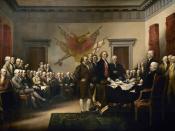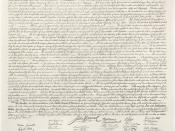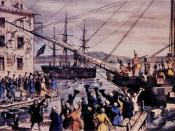He was the first to speak the morning of the Boston Massacre. Following the night of the bloodshed, citizens had gathered in hopes not only of establishing exactly what happened that fearful night but also to agree on some retaliatory plan of action. Mingled emotions of confusion, anger, and horror pervaded the assembly air. Only the poised, impassive, and eloquent matter of Samuel Adams could have settled the anxious multitude in such a time of crisis.
Samuel Adams was born September 22, 1722 in Quincy, Massachusetts. His career began in 1736 when he began attending Harvard University, and it was here that he later gained much recognition for his scholastic attainments. He received his master's degree in 1743 and went on to study law. Unfortunately, he soon dropped this profession because although his father approved, his mother strongly dissented and he wanted to respect her wishes.
In 1763, when the British began to tax the colonies, the Committee of Correspondence was appointed to express the public attitude against the event.
The instructions and the procedures for this committee were drawn up by Adams. Adams himself was outraged by the British proposal and worked avidly to support colonial efforts. He manifested a deep interest in the rights and affairs of the colonies, and was soon accepted with open arms into the patriotic party.
By 1764, at the age of 42, Adams was considered an active politician, and that same year he was elected to the Massachusetts legislature. He continued to be very active in his opposition to the passage of laws by the British legislature and was particularly opposed to the Tea Act.
Adams was part of the Sons of Liberty, along with members such as John Hancock. He drafted a protest against the Stamp Act in 1765 and was...



Sam Adams
Thanks for a good biography of a true American patriot. Rather than for his acts of patriotism, most people associate the name of Sam Adams with a popular brand of Boston beer. Shortly after he graduated from college, Sam Adams and his father set up a brewery and the rest is history. Your essay is highly readable and engaging. Well done!
6 out of 6 people found this comment useful.